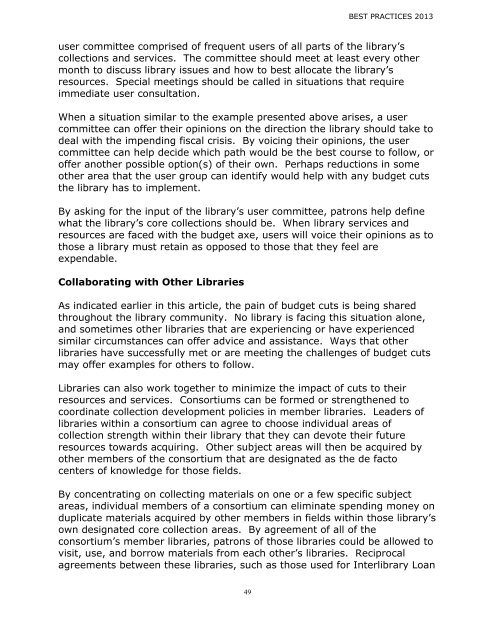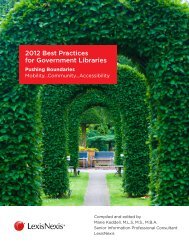- Page 2 and 3: BEST PRACTICES 2013 TABLE OF CONTEN
- Page 4 and 5: BEST PRACTICES 2013 Lexis for Micro
- Page 6 and 7: BEST PRACTICES 2013 Best Practices:
- Page 8 and 9: BEST PRACTICES 2013 Notes from SLA
- Page 10 and 11: BEST PRACTICES 2013 LIKE THE LEXISN
- Page 12 and 13: BEST PRACTICES 2013 reporting and c
- Page 14 and 15: BEST PRACTICES 2013 like libraries
- Page 16 and 17: BEST PRACTICES 2013 “Looking Ahea
- Page 18 and 19: BEST PRACTICES 2013 First we will s
- Page 20 and 21: BEST PRACTICES 2013 Tip: There is n
- Page 22 and 23: BEST PRACTICES 2013 The Government
- Page 24 and 25: BEST PRACTICES 2013 to legislative
- Page 26 and 27: BEST PRACTICES 2013 Statute at Larg
- Page 28 and 29: BEST PRACTICES 2013 Lexis Advance:
- Page 30 and 31: BEST PRACTICES 2013 Step 3: Staying
- Page 32 and 33: BEST PRACTICES 2013 logo/graphic al
- Page 34 and 35: BEST PRACTICES 2013 These are some
- Page 36 and 37: BEST PRACTICES 2013 synthesizing th
- Page 38 and 39: BEST PRACTICES 2013 Training Staff
- Page 40 and 41: BEST PRACTICES 2013 While Denise co
- Page 42 and 43: BEST PRACTICES 2013 remarkable to b
- Page 44 and 45: BEST PRACTICES 2013 Institutional L
- Page 46 and 47: BEST PRACTICES 2013 If possible,
- Page 48 and 49: BEST PRACTICES 2013 public works de
- Page 52 and 53: BEST PRACTICES 2013 librarians must
- Page 54 and 55: BEST PRACTICES 2013 Park Ranger Spe
- Page 56 and 57: BEST PRACTICES 2013 Park Ranger Spe
- Page 58 and 59: BEST PRACTICES 2013 Park Ranger Spe
- Page 60 and 61: BEST PRACTICES 2013 Realize cost sa
- Page 62 and 63: BEST PRACTICES 2013 development pla
- Page 64 and 65: BEST PRACTICES 2013 Lab Liaison Pro
- Page 66 and 67: BEST PRACTICES 2013 writing, and da
- Page 68 and 69: BEST PRACTICES 2013 ISO uses an est
- Page 70 and 71: BEST PRACTICES 2013 Thoughts on a N
- Page 72 and 73: BEST PRACTICES 2013 examine the pla
- Page 74 and 75: BEST PRACTICES 2013 The long perspe
- Page 76 and 77: BEST PRACTICES 2013 The atrium now
- Page 78 and 79: BEST PRACTICES 2013 The Library is
- Page 80 and 81: BEST PRACTICES 2013 along with an i
- Page 82 and 83: BEST PRACTICES 2013 Maintaining Ame
- Page 84 and 85: BEST PRACTICES 2013 specific groups
- Page 86 and 87: BEST PRACTICES 2013 Deployed Law Li
- Page 88 and 89: BEST PRACTICES 2013 Lexis for Micro
- Page 90 and 91: BEST PRACTICES 2013 Centralizing Di
- Page 92 and 93: BEST PRACTICES 2013 already been ap
- Page 94 and 95: BEST PRACTICES 2013 Best Practices
- Page 96 and 97: BEST PRACTICES 2013 education, trai
- Page 98 and 99: BEST PRACTICES 2013 National Cen
- Page 100 and 101:
BEST PRACTICES 2013 Let the content
- Page 102 and 103:
BEST PRACTICES 2013 Throw Out Lifel
- Page 104 and 105:
BEST PRACTICES 2013 True North Thin
- Page 106 and 107:
BEST PRACTICES 2013 future disaster
- Page 108 and 109:
BEST PRACTICES 2013 files and data
- Page 110 and 111:
BEST PRACTICES 2013 who has perform
- Page 112 and 113:
BEST PRACTICES 2013 What: Only mate
- Page 114 and 115:
BEST PRACTICES 2013 and scan the mi
- Page 116 and 117:
BEST PRACTICES 2013 Application of
- Page 118 and 119:
BEST PRACTICES 2013 and applying an
- Page 120 and 121:
BEST PRACTICES 2013 Innovation: It
- Page 122 and 123:
BEST PRACTICES 2013 James King was
- Page 124 and 125:
123 BEST PRACTICES 2013
- Page 126 and 127:
125 BEST PRACTICES 2013
- Page 128 and 129:
BEST PRACTICES 2013 provides a vari
- Page 130 and 131:
BEST PRACTICES 2013 Houston, We’v
- Page 132 and 133:
BEST PRACTICES 2013 Knowing your so
- Page 134 and 135:
BEST PRACTICES 2013 responsibility
- Page 136 and 137:
BEST PRACTICES 2013 Marketing the L
- Page 138 and 139:
BEST PRACTICES 2013 were emailed to
- Page 140 and 141:
BEST PRACTICES 2013 Coordinating Wi
- Page 142 and 143:
BEST PRACTICES 2013 Putting it into
- Page 144 and 145:
BEST PRACTICES 2013 LexisNexis Smar
- Page 146 and 147:
145 BEST PRACTICES 2013
- Page 148 and 149:
BEST PRACTICES 2013 From that momen
- Page 150 and 151:
BEST PRACTICES 2013 to future gener
- Page 152 and 153:
BEST PRACTICES 2013 Management of t
- Page 154 and 155:
BEST PRACTICES 2013 III. Urgent Nee
- Page 156 and 157:
BEST PRACTICES 2013 2. Restore and
- Page 158 and 159:
BEST PRACTICES 2013 After the Storm
- Page 160 and 161:
BEST PRACTICES 2013 for it because
- Page 162 and 163:
BEST PRACTICES 2013 to locate and c
- Page 164 and 165:
BEST PRACTICES 2013 Created effici
- Page 166 and 167:
BEST PRACTICES 2013 To be protected
- Page 168 and 169:
BEST PRACTICES 2013 These lawsuits
- Page 170 and 171:
BEST PRACTICES 2013 the final publi
- Page 172 and 173:
BEST PRACTICES 2013 The Gamificatio
- Page 174 and 175:
BEST PRACTICES 2013 you to a proper
- Page 176 and 177:
BEST PRACTICES 2013 compare their s
- Page 178 and 179:
BEST PRACTICES 2013 We will continu
- Page 180 and 181:
BEST PRACTICES 2013 Reaching Your C
- Page 182 and 183:
BEST PRACTICES 2013 Do you have a v
- Page 184 and 185:
BEST PRACTICES 2013 Invest in yours
- Page 186 and 187:
BEST PRACTICES 2013 Here are a few
- Page 188 and 189:
BEST PRACTICES 2013 Where’s Your
- Page 190 and 191:
BEST PRACTICES 2013 From Librarian
- Page 192 and 193:
BEST PRACTICES 2013 Nexis Direct 19
- Page 194 and 195:
BEST PRACTICES 2013 What We Are Doi
- Page 196 and 197:
BEST PRACTICES 2013 I also work wit
- Page 198 and 199:
BEST PRACTICES 2013 As a result....
- Page 200 and 201:
BEST PRACTICES 2013 the entire ICAN
- Page 202 and 203:
BEST PRACTICES 2013 aligned content
- Page 204 and 205:
BEST PRACTICES 2013 Figure 3. Workf
- Page 206 and 207:
BEST PRACTICES 2013 The press and b
- Page 208 and 209:
BEST PRACTICES 2013 but what will b
- Page 210 and 211:
BEST PRACTICES 2013 No Fools Gold:
- Page 212 and 213:
BEST PRACTICES 2013 Final takeaways
- Page 214 and 215:
BEST PRACTICES 2013 Reference Secti
- Page 216 and 217:
BEST PRACTICES 2013 Resourcefulness
- Page 218 and 219:
BEST PRACTICES 2013 working as a co
- Page 220 and 221:
BEST PRACTICES 2013 Lexis Diligence
- Page 222 and 223:
221 BEST PRACTICES 2013
- Page 224 and 225:
BEST PRACTICES 2013 JotNot Scanner
- Page 226 and 227:
BEST PRACTICES 2013 Speech & Langua
- Page 228 and 229:
BEST PRACTICES 2013 Travel TripIt -
- Page 230 and 231:
BEST PRACTICES 2013 Increasing You
- Page 232 and 233:
BEST PRACTICES 2013 Manage Your Res
- Page 234 and 235:
BEST PRACTICES 2013 Research Many
- Page 236 and 237:
BEST PRACTICES 2013 Formatting Comp
- Page 238 and 239:
BEST PRACTICES 2013 having tons of
- Page 240 and 241:
BEST PRACTICES 2013 houses and assi
- Page 242 and 243:
241 BEST PRACTICES 2013
- Page 244 and 245:
BEST PRACTICES 2013 necessitate goi
- Page 246 and 247:
BEST PRACTICES 2013 What unique id
- Page 248 and 249:
BEST PRACTICES 2013 When the projec
- Page 250 and 251:
BEST PRACTICES 2013 areas we have c
- Page 252 and 253:
BEST PRACTICES 2013 Stephen Wolfram
- Page 254 and 255:
BEST PRACTICES 2013 2. Let's define
- Page 256 and 257:
BEST PRACTICES 2013 shakers in libr
- Page 258 and 259:
BEST PRACTICES 2013 Knowing Is Half
- Page 260 and 261:
BEST PRACTICES 2013 Public Records
- Page 262 and 263:
BEST PRACTICES 2013 https://www.nic
- Page 264 and 265:
BEST PRACTICES 2013 • Non-Profits
- Page 266 and 267:
BEST PRACTICES 2013 http://www.open
- Page 268 and 269:
BEST PRACTICES 2013 LexisNexis Publ
- Page 270 and 271:
269 BEST PRACTICES 2013
- Page 272 and 273:
271 BEST PRACTICES 2013
- Page 274 and 275:
273 BEST PRACTICES 2013
- Page 276 and 277:
BEST PRACTICES 2013 2) on the issue
- Page 278 and 279:
BEST PRACTICES 2013 Again, however,
- Page 280 and 281:
BEST PRACTICES 2013 The noteworthy
- Page 282 and 283:
BEST PRACTICES 2013 Related record
- Page 284 and 285:
BEST PRACTICES 2013 is so prevalent
- Page 286 and 287:
BEST PRACTICES 2013 Best Practices
- Page 288 and 289:
BEST PRACTICES 2013 Example of best
- Page 290 and 291:
BEST PRACTICES 2013 Best practices:
- Page 292 and 293:
BEST PRACTICES 2013 that are very s
- Page 294 and 295:
BEST PRACTICES 2013 I-900’s lack
- Page 296 and 297:
BEST PRACTICES 2013 most specialist
- Page 298 and 299:
BEST PRACTICES 2013 6 There are oth
- Page 300 and 301:
BEST PRACTICES 2013 Find the Librar
- Page 302 and 303:
BEST PRACTICES 2013 Here are the sp
- Page 304 and 305:
BEST PRACTICES 2013 How we learn:
- Page 306 and 307:
BEST PRACTICES 2013 If everyone is
- Page 308 and 309:
BEST PRACTICES 2013 3. Melissa - yo
- Page 310 and 311:
BEST PRACTICES 2013 The form of thi
- Page 312 and 313:
BEST PRACTICES 2013 But an importan
- Page 314 and 315:
BEST PRACTICES 2013 Capt. Smith spe
- Page 316 and 317:
BEST PRACTICES 2013 Notes from SLA
- Page 318 and 319:
BEST PRACTICES 2013 Success is not
- Page 320 and 321:
BEST PRACTICES 2013 Archivist, Digi
- Page 322 and 323:
BEST PRACTICES 2013 Jane summed it
- Page 324 and 325:
BEST PRACTICES 2013 partners, acces
- Page 326 and 327:
BEST PRACTICES 2013 concepts, word
- Page 328 and 329:
BEST PRACTICES 2013 tweeters are in
- Page 330 and 331:
BEST PRACTICES 2013 organize data.
- Page 332 and 333:
BEST PRACTICES 2013 library institu
- Page 334 and 335:
BEST PRACTICES 2013 Creating Your T
- Page 336 and 337:
BEST PRACTICES 2013 Creating a Forw
- Page 338 and 339:
BEST PRACTICES 2013 can you use the
- Page 340 and 341:
BEST PRACTICES 2013 included quotes
- Page 342 and 343:
BEST PRACTICES 2013 Originally post
- Page 344 and 345:
BEST PRACTICES 2013 2012 Best Pract



